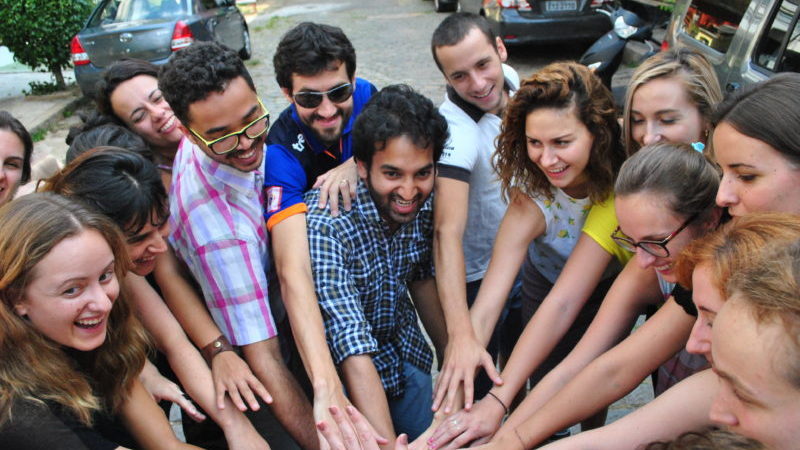This is a cross-post from Stanford Social Innovation Review by Sarina Beges, Associate Director at | Co-Founder Stanford Program on | September 4, 2015
It is time for universities to rethink how they deliver social impact education, prioritizing experiential and purpose-based training over start-up competitions.
As more students look to pursue meaningful careers in the social sector, it is imperative that educational institutions offer experiential and purpose-based training to support their personal and professional growth. Complex local and global challenges demand innovative solutions that are developed collaboratively by those with the experience, relationships, and values to effectively advance social change. There is no textbook for teaching social change, and the closer we can bring students to social problems–both inside and outside of the classroom–the more informed and effective they will be in developing solutions.
At Stanford University, where I help lead a program on social entrepreneurship, students become part of an entrepreneurial culture from the time they set foot on campus. Whether launching student groups or social enterprises, the desire—and pressure—to create something new permeates much of the fabric of student life on campus. This is reinforced by a surge of competitions and awards that encourage aspiring social changemakers to experiment, fail, and then try again.
As the social entrepreneurship movement becomes increasingly more attractive to young people, we see that they are applying some of these market-driven principles—often unwisely—to the social sector. For example, the desire to start a new organization often outweighs the interest in driving change from inside an existing one as an “intrapreneur.” With an estimated1.5 million nonprofit organizations in the United States competing for diminishing resources, it doesn’t always make sense to start something new when a product or service already exists. Failure may be a badge of honor for Silicon Valley entrepreneurs, but when nonprofits close their doors, they let down the communities they are trying to serve and waste precious resources that they could have directed elsewhere.
With this in mind, we designed our program to equip future generations of social change leaders with a fuller range of skills—and the humility—they need to be impactful in their work. Through experiential learning inside and outside the classroom, students work alongside nonprofit organizations to witness how they innovate new approaches to social-change problems. They are able to observe how organizations tackle challenges with creativity, empathy, and a partnership-based approach, helping provide a holistic set of values that will serve them in their future careers. As more students graduate to pursue social-sector careers, it is increasingly important for higher education and leadership programs to incorporate these practice-based experiences into their curriculum, and better connect theory with practice. Cornerstones of our program include:
Community-engaged learning underpins our teaching model. Students get to work on service-learning projects for local nonprofit organizations and learn how successful organizations deliver social change. When designing high-impact fundraising campaigns or surveying partners in the field, students work on projects to support an organization’s growth, while gaining practical skills. At the same time, they experience the values and culture that guide mission-driven organizations. Interacting with the local community outside of the classroom builds listening and empathy skills, while asking challenging questions about privilege and bias that emerge through these experiences. Working with the executive directors of these organizations underscores the backbreaking work that it takes to launch, grow, and scale-up a social change organization—lessons that can help influence their own career decisions.
Field-based fellowships give students the opportunity to serve internationally or locally with our nonprofit partners to implement their service-learning projects in the field. More importantly, these experiences let students explore the local context of the problem, engage directly with community partners, and examine the greater ecosystem in which the organization is operating. This perspective can profoundly transform how a student views a problem, and inform the way they design a program or intervention. Student internships or programs like Alternative Spring Break, where students volunteer their time during a school holiday to examine a social issue in their local community, should be part of any social-impact program so that they have a direct connection to the social challenges they are often so far removed from in their everyday lives.
The partnership approach: Our program also helps reinforce the importance of partnerships as an essential building block for social change. As evidenced by so manyfailed development projects, organizations operating with good intensions but without community partnership will not only fail, but also risk negatively impacting the communities they are trying to serve. We highlight some of these missteps inside the classroom and contrast them with strong models from our community partners. These include the Global Women’s Water Initiative (GWWI), which works together with African women to build culturally appropriate, locally sourced, and sustainable clean water technologies. Many of these remarkable women have then gone on to start GWWI chapters in East Africa, becoming water trainers and entrepreneurs themselves. Students learn from these anecdotes, and the importance of building trust in a community, because solutions imposed from the outside rarely last. We model the value of partnership inside the classroom by grouping students into teams for service-learning assignments so they bring a diverse set of skills, perspectives, and experiences to the assignment. Team-based work underscores the collaborative nature of social change; it highlights the value of working together to generate ideas that are not driven by one person alone, but by the collective knowledge of a group.
Stanford student (left) with the Global Women’s Water Initiative team during a Stanford Haas Center supported summer fellowship in Uganda. (Image courtesy of Global Women’s Water Initiative team)
Connecting to youthful purpose: Research highlights the important role that teachers and universities play in helping young people connect to their greater purpose—something many struggle to find at a young age. We are experimenting with innovative curriculum and training programs that shine a more introspective lens on this question through practical exercises and reflective work. Curriculum, such as Echoing Green’s Work on Purpose, help young people connect more deeply to their purpose and explore ways they can make the world a better place. And programs such as the Transformative Action Institute and the Amani Institute are equipping a new generation of changemakers with the skills they need to be more self-reflective, humble, resilient, and culturally sensitive—qualities essential to tackling complex social issues. These initiatives all form an emerging body of social entrepreneurship education that helps instill values and a greater sense of purpose to prepare future generations of social impact makers.
As the social change sector attracts a new wave of university graduates, it is crucial that higher education responds by providing more meaningful experiences for students to learn through direct engagement. By working with community partners, supporting student fellowships, and experimenting with purpose-driven programming, we can better prepare our students for the challenges and complexities of social change work. It is time to put aside the awards and competitions, and focus on training social movement builders who are guided by purpose and values to make more meaningful and lasting contributions to the field.





